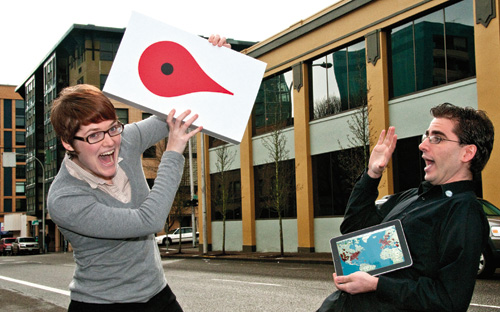 Location-based mobile platform Geoloqi was born from a long-shared obsession by two people, Amber Case and Aaron Parecki.
Location-based mobile platform Geoloqi was born from a long-shared obsession by two people, Amber Case and Aaron Parecki.
 |
Amber Case and Aaron Parecki have launched Geoloqi, a real-time, location-based service in Portland. // PHOTO BY TERESA MEIER |
Location-based mobile platform Geoloqi was born from a long-shared obsession by two people, Amber Case and Aaron Parecki. Case, 24, a self-proclaimed “cyborg anthropologist” and one of Fast Company’s most influential woman in tech, had been working on and speaking about the intersection between our digital and real selves.
Parecki, 26, meanwhile, was experimenting with this very intersection by tracking and mapping his movements with the GPS in his phone. The two were introduced in 2009 and began experimenting with real-time, location-based services. The duo soon realized they were onto something and launched the Portland-based company Geoloqi in April 2010.
Think of Geoloqi as a platform for a new kind of app, one that will allow functions based off real-time geographic location. Want your friend to receive an automatic text message when you’re five blocks from his house? There’s a Geoloqi app for that. Or at least there will be.
The Geoloqi platform currently features only a handful of apps. A notes feature, for example, allows users to write themselves notes and choose the location when they want it displayed. Need milk? Write yourself a note and Geoloqi will remind you next time you’re at the store. They’re building and releasing more apps, Case says.
Geoloqi could present a threat to existing mobile platforms, such as Foursquare and Facebook Places, which both provide location-based services, but require you to check in using the services. Geoloqi does this automatically.
Geoloqi is not the only player in this area. What it seems to have achieved is a user-focused technology that cuts down on the time spent updating social media platforms or coordinating with friends and colleagues.
Case and Parecki also say their privacy features are better than competitors.’ Users can use the service anonymously, select with whom they share, and set the length of time for sharing data. “These all-or-nothing networks don’t represent people’s real relationships,” Parecki says. “Location is one of the most sensitive pieces of information people have.”
The pair is seeking funding and has secured a large commercial contract with an Oregon- based company. The client is not yet ready to announce the project, Case says.
Whether or not Geoloqi will become the platform from which the next generation of geo-location apps will spawn is yet to be seen. But the duo says they’re well positioned. “I think we’re right at that turning point now,” says Parecki.


